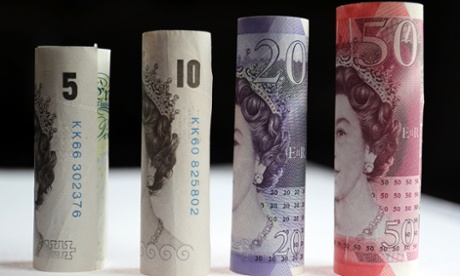
Britain’s economic recovery slowed in the fourth quarter of 2014, but annual growth was the fastest since the financial crisis of 2007.
With 100 days until the general election, evidence of a slowdown and continued reliance on consumer spending to drive the recovery will come as blow to George Osborne. But the chancellor seized on news that, at 2.6% in 2014, the UK’s growth was the “fastest of any major economy”. That also marked the strongest growth since 2007.
Official figures showed that in the final three months of 2014, however, GDP growth slowed to a quarterly rate of 0.5%. That was slower than third-quarter growth of 0.7%, and disappointed City analysts, who forecast 0.6%.
Economists said a sharp fall in oil prices should continue to boost household budgets and overall growth this year. But they also highlighted risks from uncertainty around the election in May and renewed troubles in the eurozone, particularly after the anti-austerity party Syriza was voted into government in Greece this week.
Chris Williamson, economist at Markit, which publishes surveys on the UK and other economies, listed several challenges ahead.
“The eurozone is potentially entering a new phase of political uncertainty arising from the anti-austerity Syriza party victory in Greece. The upcoming general election in the UK also poses a threat to stability in the event of an inconclusive outcome. There’s also the possibility of financial market stress if the US starts to hike interest rates later this year, and geopolitical risks such as the escalation of the Russian-Ukraine crisis likewise pose a threat to global stability.”
The Office for National Statistics chief economist Joe Grice said it was “too early to say” if the slowdown evident in the fourth quarter would persist.
The slowest quarterly growth for a year knocked the pound, which weakened against the dollar and against the euro.
Growth in the fourth quarter was reliant on the UK’s dominant services sector, where output grew by 0.8%. In a blow to Osborne’s ambitions to rebalance the economy away from a heavy reliance on consumer spending, construction output shrank by 1.8% and manufacturing fell by 0.1%.
Grice said: “The dominant services sector remains buoyant while the contraction has taken place in industries like construction, mining and energy supply, which can be erratic.”
James Knightley of Global Economics said that although this was the eighth consecutive quarterly expansion, the loss of momentum during the quarter was “disappointing” and that the long-heralded rebalancing story in the UK “has completely stalled”.
The figures showed only the UK’s dominant services sector is back to its pre-crisis strength.
The manufacturers’ organisation, EEF, expressed concern about the recent slowdown in some sectors,
“The UK has an enviable performance compared with most other developed economies, but there was some notable weakening, not least in parts of manufacturing, through the second half of 2014,” said Lee Hopley, chief economist at EEF.
“With UK manufacturers entering 2015 in a more cautious mood, given some of the risks in the global outlook, the next 100 days of election campaigning need to shed more light and certainty on the priorities for business growth, investment and job creation.”
Opposition parties also focused on those areas of the economy that struggled in the final months of 2014.
Labour’s shadow chancellor, Ed Balls said: “Construction is down again, business investment under this government is lagging behind our competitors and exports are way off target.”

